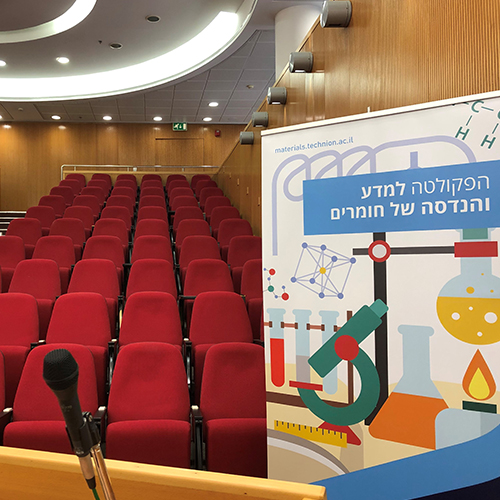
Mrs. Ella Peled - PhD candidate
16/02/2023
אודיטוריום ע"ש דויד וואנג, בניין מידן, קומה 3
14:30
Macrophages are highly plastic phagocytic cells that play key roles in the immune response, and
physiological and pathological pathways. They can exist in different activation states, known as
polarization, which determines their phenotype, namely their function and behavior. They can be
classically activated to the pro-inflammatory M1 phenotype or alternatively activated to an M2 anti-inflammatory one by various stimuli in their microenvironment. Different biomaterials polarize
macrophages to M1 or M2 phenotypes and emerged as a very promising strategy to modulate their
activation and performance. In this Ph.D. thesis, we investigate the ability of drug-free amphiphilic
nanoparticles (hydrodynamic diameter of ~140 nm) produced by the self-assembly of a graft copolymer
of hydrolyzed galactomannan, a natural polysaccharide of galactose and mannose, that was
hydrophobized in the side-chain with poly (methyl methacrylate) blocks to trigger the polarization of
murine and human macrophages. After a comprehensive characterization of the nanoparticle features, we assessed their cell compatibility, cell endocytosis mechanisms, and effect on murine and human
macrophage polarization in vitro. Results indicate that these nanoparticles are internalized by both
clathrin- and caveolin-mediated endocytosis. In addition, they polarize murine RAW264.7 and human
THP-1 macrophages to the M2-like phenotype and reprogram an M1 to an M2 phenotype, as indicated
by complementary RNA-sequencing, real-time-quantitative polymerase chain reaction (RT-qPCR), flow
cytometry, and enzyme-linked immunosorbent assay (ELISA). Moreover, we preliminarily assess the
effect of the nanoparticles on wound healing by tracking the closure of an artificial wound of RAW264.7
macrophages in a scratch assay. Findings indicate a faster closure of the wound in the presence of the
nanoparticles with respect to untreated cells. Finally, a migration assay utilizing a macrophage/fibroblast
co-culture model in vitro demonstrates that M2 polarization increases fibroblast migration by 24-fold
with respect to untreated cells. Overall results point out the promise of these nanoparticles to modulate
the macrophage phenotype and their potential in drug-free therapeutics.
BIO
- Finished BSc in Ben Gurion University
- MSc in the biology faculty at the Technion, in the field of cancer research


